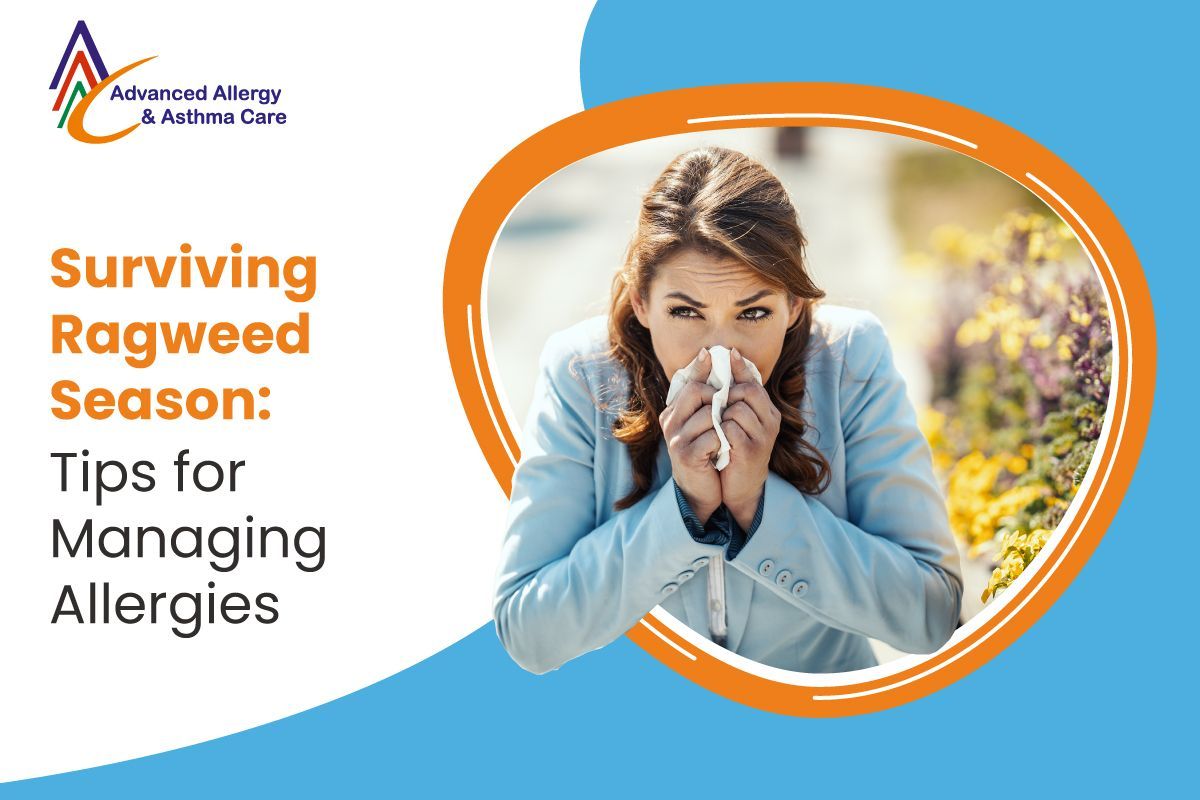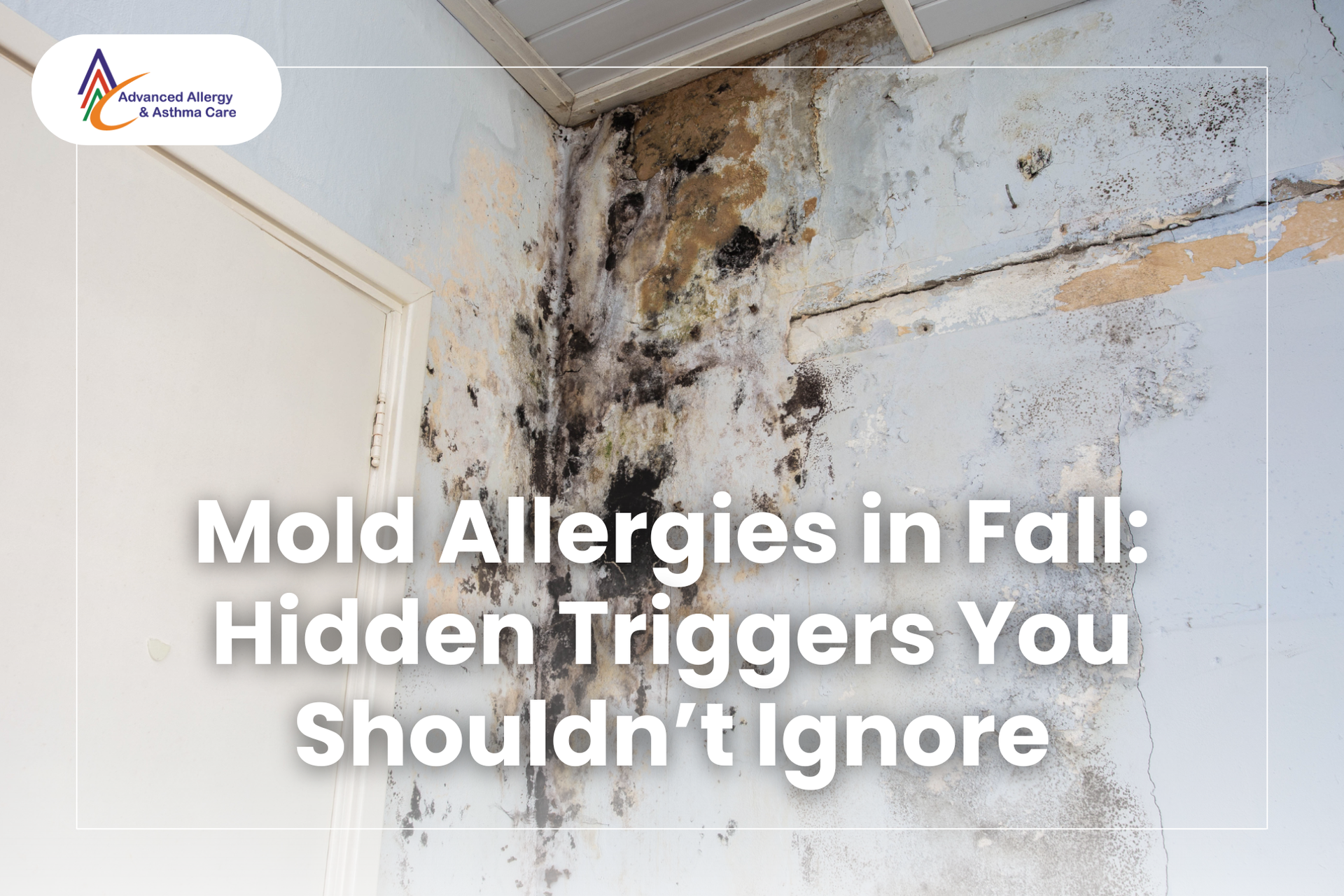As the ragweed season approaches, many individuals struggle with irritating allergy symptoms. According to
Allergy and Asthma Network, approximately 23 million suffer from ragweed
allergies annually. Ragweed is a common weed found in many regions, and its pollen can trigger allergic reactions, causing discomfort and disrupting daily activities.
If you are one of the many people who face challenges during this time of the year, worry not!
Here’s a comprehensive guide with valuable insights and practical tips for managing allergies during the ragweed season. By understanding the triggers and implementing proper strategies, you can make it through this season with comfort and confidence.
What is Ragweed, and When is Ragweed Season?
Ragweed is a flowering plant known for releasing vast amounts of pollen during its season, typically starting in late summer and extending into the fall. The pollen is lightweight and can travel long distances by air, making it a common allergen for individuals in various locations.
Identifying Ragweed Allergy Symptoms
Recognizing the symptoms of ragweed allergies is essential for early intervention and effective management. Common ragweed allergy symptoms include runny or stuffy nose, sneezing, watery or itchy eyes, and scratchy throat. Some individuals may experience skin reactions, such as
hives or eczema.
Understanding Cross-Reactivity With Other Allergens
Cross-reactivity occurs when your immune system reacts to proteins in ragweed pollen that resemble those found in other substances. This phenomenon can lead to additional allergies, such as
, where consuming certain fruits and vegetables triggers allergic reactions. Understanding cross-reactivity can help you avoid potential allergens and manage your symptoms better.
Minimizing Exposure to Ragweed Pollen
To manage ragweed allergy better, reduce exposure to ragweed pollen. Knowing when and how to avoid these allergens will make your life easier during ragweed season.
- Monitor Pollen Counts: Stay informed about daily pollen forecasts and try to limit outdoor activities on high pollen count days.
- Keep Windows Closed: Keep your doors and windows closed at home and in your car to prevent pollen from entering.
- Use Air Purifiers: Invest in high-quality air purifiers that can remove allergens indoors.
- Shower and Change Clothes: When you get home from spending time outdoors, bathe and change into clean clothes to remove pollen from your body and clothing.
Ragweed Allergy Treatment
Various over-the-counter and prescription medications can alleviate ragweed allergy symptoms. The effectiveness depends on your reaction to the drug or the severity of your allergy.
- Antihistamines: Antihistamines effectively reduce sneezing, itching, and a runny nose. These medications provide effective allergy relief for ragweed.
- Nasal Steroids: Nasal steroid sprays can help reduce inflammation and congestion in the nasal passages.
- Decongestants: Decongestant medications can provide short-term relief from nasal congestion.
- Allergy Shots (Immunotherapy): Allergy shots may be recommended for severe cases, as they can desensitize the immune system to ragweed pollen over time.
We recommend consulting with your allergist before you start any new medication or treatment.
Ragweed Allergy Natural Remedies
For those seeking natural alternatives, several remedies and homeopathic approaches may relieve ragweed allergy symptoms. Home remedies are safe and convenient.
- Local Honey: Consuming locally sourced honey may help build tolerance to local pollens, including ragweed.
- Butterbur Extract: Butterbur is an herb that may alleviate allergy symptoms. However, consult your doctor before using any herbal supplement.
- Nasal Rinsing: Nasal irrigation with
saline solution can help remove allergens from the nasal passages.
Maintaining Indoor Allergy Control
Creating an allergen-free environment indoors can significantly reduce allergy symptoms.
- Regular Cleaning: Dust and vacuum regularly to remove allergens from your living space.
- Purify the Air: Modern Air cleaners with HEPA filters trap and remove airborne allergens.
- Avoid Indoor Plants: Some indoor plants can release pollen and trigger allergies.
Making Dietary Changes to Support Allergy Management
Watching the food you eat is crucial to managing allergies. Eating allergy-friendly foods can make a difference where it matters most.
- Anti-Inflammatory Foods: Incorporate anti-inflammatory foods into your diet, such as vegetables, fruits, and omega-3 fatty acids.
- Avoid Trigger Foods: If you experience cross-reactivity, avoid triggering foods that worsen your allergy symptoms.
Outdoor Allergy Safety Measures
When spending time outdoors during ragweed season, take safety measures to protect yourself. Awareness helps reduce the risks of accidental allergen exposure.
- Wear Protective Clothing: Cover your skin with long sleeves and pants to minimize contact with pollen.
- Wear Sunglasses: Wear sunglasses or specialty glasses to protect your eyes from pollen exposure.
- Plan Outdoor Activities Wisely: Engage in outdoor activities only when pollen counts are lower.
Managing Ragweed Allergies in Children
Children can also experience ragweed allergies. That's why you should prepare for emergency cases to keep them protected.
- Communicate With School: Inform your child's school about their allergies, and work together to create a safe, allergy-free environment for children.
- Medication Management: Ensure that your child takes allergy medications as prescribed.
Traveling During Ragweed Season
Traveling during ragweed season requires extra preparation. Allergies can occur anytime or anywhere. Protect yourself from allergies while on the road with advanced planning.
- Research Your Destination: Check the pollen levels at your destination and plan accordingly.
- Pack Allergy Medications: Bring enough allergy medications for your trip.
Coping with Ragweed Allergies Emotionally
Living with allergies can be emotionally challenging. Luckily, there are a couple of ways to help you cope with the condition and improve your well-being.
- Join Support Groups: Connect with others who share similar experiences and challenges.
- Practice Stress Management: Engage in activities that reduce stress and promote relaxation.
Stay on Top of Your Allergies During Ragweed Season!
Surviving ragweed season and managing allergies is possible with the proper knowledge and a proactive approach. You can comfortably navigate this time of the year with a good understanding of your triggers, exposure levels, and appropriate medications or natural remedies.
Remember to consult with an allergy expert for personalized advice and treatment options. By controlling your allergies, you’re just a few steps away from enjoying nature's beauty without discomfort.
FAQs
Does ragweed bloom?
Yes, ragweed normally blooms from late summer into the fall months.
Can ragweed allergies cause asthma?
Some individuals with ragweed allergies may experience
asthma symptoms due to exposure to ragweed pollen.
How long does ragweed season last?
Ragweed season typically lasts from late summer to the first frost, usually in the fall.
Are there any allergy shots specifically for ragweed allergies?
Allergists can provide allergy shots tailored to ragweed allergies to help reduce symptoms.
Can I outgrow ragweed allergies?
While some individuals may outgrow specific allergies, ragweed allergies tend to persist throughout adulthood.
Can ragweed allergies be prevented?
While you cannot prevent ragweed allergies entirely, you can manage and reduce symptoms by taking appropriate measures.
Can ragweed allergies cause skin rashes?
Yes, ragweed allergies can sometimes cause skin reactions, such as hives or eczema, in susceptible individuals.
Protect Yourself from Ragweed Allergy with the Help of Advanced Allergy and Asthma Care!
If you’re filling out your search box with "best medicine for ragweed, what to do for ragweed allergy, and ragweed hay fever,” you're on the right page!
Advanced Allergy and Asthma Care provide personalized ragweed allergy treatment options using evidence-based methods. Our board-certified allergists are always ready to help you achieve maximum protection during allergy season.
To request an appointment that suits your schedule, dial(727) 544-8100 or (813) 476-3394.
You can also
book an appointment here.









